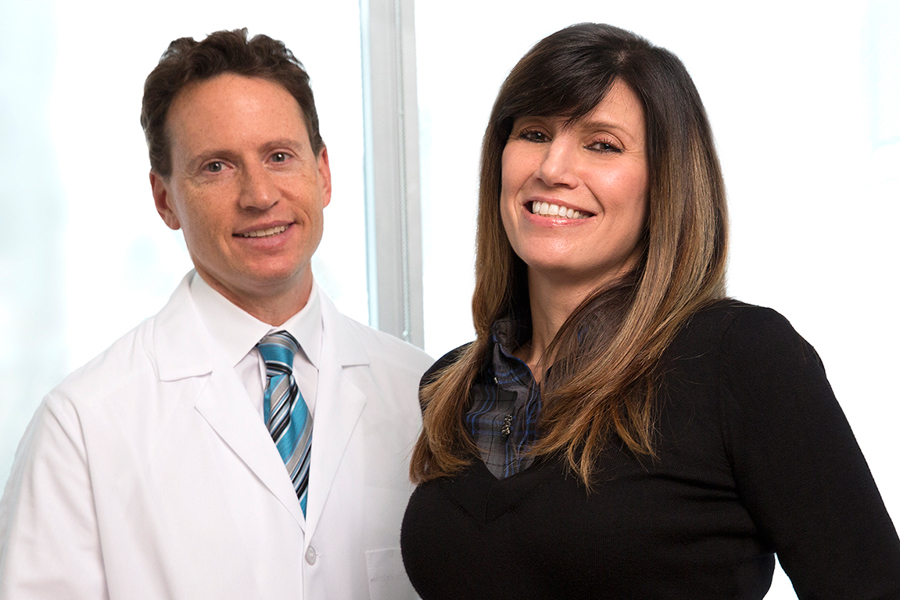
When Tracy Branick met Dr. Ted Schwartz, director of the Center for Epilepsy and Anterior Skull Base and Pituitary Surgery at Weill Cornell Medicine, she was immediately put at ease. He was warm, kind and confident that he could help her treat the epileptic seizures that were affecting her daily life. “Even if I wasn’t having a seizure, I was constantly worried that I would have one,” she says.
Although Tracy had been on a variety of medications for the 16 years prior to meeting Dr. Schwartz, every few years she would become immune to them – and the seizures would return. Surgery seemed to be the best way forward. And, because the focal point of her seizures was in a non-functional part of the brain, Dr. Schwartz, the David and Ursel Barnes Professor of Minimally Invasive Surgery, and his team were able to safely remove the seizure focus, preventing further spread without creating brain damage. Since her surgery, Tracy has been seizure-free.
“Epileptic seizures arise from the brain – which is the essence of who we are,” says Dr. Schwartz, a 2015 Daedalus award recipient, who is also co-director of surgical neuro-oncology. “Conventional surgery allows us to treat some patients, like Tracy, whose seizures are located in non-functional areas of the brain. But, in a majority of cases, we can’t operate because the seizures occur in more critical locations – if we damage those areas of the brain, the person may never be the same.” Thanks to support from the Daedalus Fund, Dr. Schwartz will now be one step closer to addressing this challenge and providing surgical treatment for more patients with this disease.
The Daedalus Fund is one of many donor-supported initiatives that encourage and facilitate innovation and discovery by world-class faculty at Weill Cornell Medicine. Daedalus funds help bridge the post-discovery/ pre-commercial development gap, making early-stage research projects more attractive for potential industry partners, a crucial step toward speeding new cures and treatments to patients.
Dr. Schwartz and his colleagues, including Chris Schaffer, associate professor in biomedical engineering at Cornell University, have spent many years searching for ways to treat epileptic patients who are not candidates for conventional surgery. In that time, they have created a surgical tool that may help to accomplish their goals: a laser scalpel that can cut into the grey matter of the brain without damaging either critical brain tissue or the overlying blood vessels that supply it with oxygen. To date, the laser, which works by sending out tightly focused infrared pulses, has been tested in the laboratory but has not yet moved into clinical trials – an essential step to test safety and efficacy before obtaining a patent. Support from the Daedalus Fund will help make this laser a stronger candidate for licensing – bringing it one step closer to being patient-ready.
“The state of medicine – as great as it is, and as much as we’ve accomplished – is currently not sufficient to cure and treat so much of human disease,” says Dr. Schwartz. “Research, collaborative work and partnerships with industry are critical to moving medicine to the next level, so that we can address those diseases and give our patients the finest care.”
Pioneering research like Dr. Schwartz’s work is happening at Weill Cornell Medicine every day – world-class scientists are working side-by-side with top-tier clinicians, speeding the latest cures and treatments to patients. And, thanks to the support of leadership and many donors and friends, the institution has significantly expanded its research enterprise during the past few years – and continues to grow exponentially. Donor support has helped to advance early-stage research projects, promote groundbreaking work by top-tier faculty, and recruit new leading lights to campus – all with the goal of helping patients – and it’s paying off in spades.
With the help of many donors, Weill Cornell Medicine has recruited more than 50 esteemed scientists and physician-scientists since 2012 who are spurring new research discoveries using precision medicine and other cutting-edge biomedical approaches, and seamlessly applying them to patient care. The donor-funded Belfer Research Building, which opened in 2014, serves as the hub for these translational efforts, housing more than a half dozen newly established interdisciplinary centers and institutes. This important work has led to a 20 percent growth in sponsored research support – funding received from external sources such as government or industry – for Weill Cornell Medicine.
“I am so proud of the incredible work that our physicians and scientists are doing at Weill Cornell Medicine,” says Dr. Laurie H. Glimcher, Stephen and Suzanne Weiss Dean. “The robust growth of our research program is a testament not only to the fine caliber of our faculty, but also to the ongoing support from our donors and friends. As we increase our funding for research, we create even more opportunities to provide the most cutting-edge treatments to our patients. There is nothing more essential than that.”
To support the Daedalus Fund or other critical research initiatives at Weill Cornell Medicine, please contact:
Christine Hughes
Director of Institutional Giving & Science Programs
646-317-7366 or chh2038@med.cornell.edu
